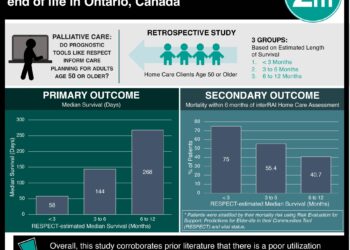Palliative care intervention improves quality of life during hospitalization for hematopoietic stem cell transplantation
1. Palliative care involvement helps lessen quality of life (QOL) decline compared to standard care during hospitalization for hematopoietic stem cell transplantation.
2. Patients treated with palliative care also demonstrated reduced symptom burden, depression symptoms, and anxiety symptoms.
Evidence Rating Level: 1 (Excellent)
Study Rundown: Hematological malignancies are complex diseases that affect patients of all ages. While hematopoietic stem cell transplantation (HCT) remains the cornerstone of treatment, many patients may experience significant physical and psychological distress due, in part, to chemotherapy and post-transplantation complications. In fact, patients often report reduced quality of life (QOL) while hospitalized for HCT. Compared to those with solid tumors, palliative care teams are infrequently consulted for patients with hematological malignancies. This study, therefore, sought to assess the impact of inpatient palliative care on patients undergoing HCT at a single institution. Over a 2-week period while in the hospital, patients randomly assigned to receive consultation from palliative care physicians reported a higher overall QOL as well as fewer symptoms of depression, anxiety, and disease burden. This difference remained significant after 3 months of follow-up.
Overall, this study suggests that palliative care interventions benefits patients undergoing HCT in the hospital. However, this study may have limited generalizability given that it was conducted at a single site with a racially homogenous cohort. Additionally, the study was not blinded, nor did it provide an attention-controlled placebo group. Given these limitations, future studies should replicate these findings and consider the effects of palliative care on additional long-term patient outcomes, cost of care, and hospital utilization.
Click to read the study in JAMA
Relevant Reading: Haematological malignancy: are patients appropriately referred for specialist palliative and hospice care? A systematic review and meta-analysis of published data
In-Depth [randomized clinical trial]: Adult patients admitted for autologous and allogeneic HCT at the Massachusetts General Hospital, and their caregivers, were enrolled in a non-blinded randomized clinical trial. Baseline study questionnaires were completed before participants were randomized to receive either palliative care interventions or standard transplant care. All patients were 18 years or older. The Functional Assessment of Cancer Therapy-Bone Marrow Transplant (FACT-BMT) scale was utilized to assess the patient’s QOL, with the FACT Fatigue subscale used to measure fatigue. Better QOL and lower fatigue were reflected by higher scores on the two scales. Patients also completed the Hospital Anxiety and Depression Scale (HADS), Patient Health Questionnaire 9 (PHQ-9), and the posttraumatic stress disorder (PTSD) Checklist – Civilian Version. The revised Edmonton Symptom Assessment Scale (ESAS) were used to measure symptom burden. Change in QOL from baseline to week 2 of hospitalization which is considered the most symptomatic phase comprised the primary end point. In all, 242 patients were screened for eligibility, and 160 (86%) enrolled in the study. Intervention patients reported a lower decrease in QOL from baseline to two weeks (-6.82 difference between groups, p = 0.045). Similarly, from baseline to week 2, intervention patients had lower depression scores, lesser anxiety symptoms, decreased symptom burden, and no difference in fatigue. At 3 months, intervention patients continued to have higher QOL and lesser depression. Among the caregivers, improvement in reported coping and in the administrative and financial domains of QOL were found from baseline to week 2.
Image: CC/Wiki
©2016 2 Minute Medicine, Inc. All rights reserved. No works may be reproduced without expressed written consent from 2 Minute Medicine, Inc. Inquire about licensing here. No article should be construed as medical advice and is not intended as such by the authors or by 2 Minute Medicine, Inc.







